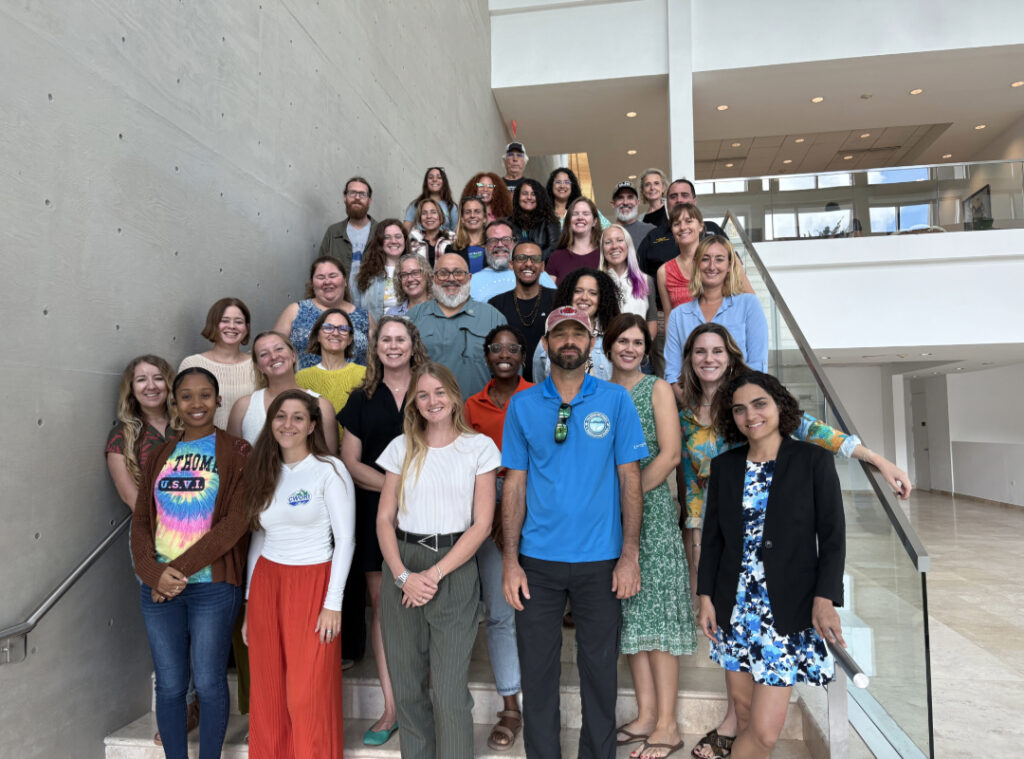Rachel Guyer is the Coral Conservation Associate for Florida Sea Grant and works closely with the National Coral Disturbance Coordinator, Caroline McLaughlin.
Participants of the 2025 U.S. Caribbean Regional Coral Disturbance Workshop. Image by Rachel Guyer.
Bright sunshine and mild weather made for a warm welcome to the 2025 U.S. Caribbean Regional Coral Disturbance Workshop. The event was held from February 4-6, 2025 in San Juan, Puerto Rico, and hosted by Florida Sea Grant (FSG) in collaboration with NOAA’s Coral Program, Puerto Rico Department of Natural and Environmental Resources, and U.S. Virgin Islands (USVI) Department of Planning and Natural Resources. Coral researchers, managers, and practitioners from Florida, Puerto Rico, and the USVI representing government agencies, universities, and community partners participated in the event.
There is a lot going on with respect to coral conservation across the globe, and the main goals of this meeting were to exchange information, coordinate disturbance preparedness and response efforts, and collaborate on projects in the U.S. Caribbean region. New threats to corals have necessitated a joint shift in focus from solely stony coral tissue loss disease (SCTLD) – the previous coral disease of most concern – to broader coral disease and disturbance response efforts throughout the region, supported by inter-jurisdiction collaboration. A major focus was sharing information regarding coral bleaching response, coordinating restoration plans, responding to invasive soft corals, and discussing federal environmental compliance and funding for coral restoration and storm mitigation – a lot to get through in just two days!
The workshop commenced with jurisdictional updates from the last year on coral disturbance preparedness and response from partners across the Caribbean. Widespread bleaching, invasive soft coral introduction, disease outbreaks, and boating incidents were addressed by region. The need for increased communications, data management, and funding was a common thread. Some partners shared their successes in developing citizen science monitoring and increasing public education on threats impacting their local reefs. Altogether, everyone experienced coral disturbances that illuminated challenges in coordination and response efforts.
Facilitators from the USVI reading participant contributions to the group activity Bleaching: Lessons Learned. Image by Rachel Guyer
The creation of two coral rescue coordinator positions for Puerto Rico and the USVI were prioritized during past workshops in 2023 and 2024 to help guide regional efforts to preserve coral biodiversity. These positions were funded in 2025 by a grant from the National Fish and Wildlife Foundation to FSG, and the coordinators were hired in March. They are working to develop a regional coral rescue plan and facilitate a regional coral rescue network.
Two group activities allowed for collaboration and problem-solving on shared challenges confronting the Caribbean. The first focused on lessons learned from past bleaching events. To provide context, in 2023 and 2024 the USVI, Puerto Rico, and Florida experienced record-breaking heat and subsequent coral bleaching, with some reefs experiencing more than 50% prevalence of bleaching. Species that were most impacted include elkhorn coral (Acropora palmata), staghorn coral (Acropora cervicornis), and mountainous star coral (Orbicella faveolata). Despite targeted rescue efforts, many populations of corals have yet to recover. And if that was not enough, increased bleaching led to increased disease susceptibility, with many corals contracting secondary infections that caused mortality.
For the activity, participants were divided into seven groups and given prompts and flip charts to record and later present their discussion to everyone. Topics included bleaching extent and impacts, intervention strategies and outcomes, future research priorities, data collection challenges and successes, lessons learned, resource and capacity gaps, and plans for the next bleaching event. During the discussion, all jurisdictions noted funding and capacity gaps, data reporting gaps, mentioned incorporating molecular techniques to elucidate resilience of corals to bleaching, incorporating new technology into data collection, and the need for response standardization ahead of the next bleaching event.
